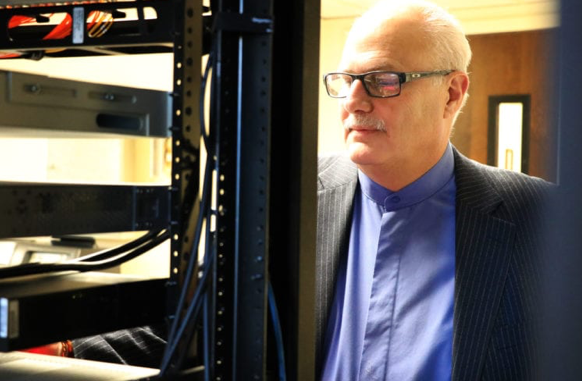WLU’s Chief Information Officer, Joe Rodella, featured in Trade Magazine
Joe Rodella talks about on-demand classes in a Trade Magazine.
Joe Rodella, Chief Information Officer/Chief Operations Officer, gets a feature in Toggle written by Jason Pafundi. Toggle is a quarterly business-to-business trade journal. This feature explains how Rodella helped make on-demand classes with our university-developed digital television station, Topper Station, which usually broadcasts sports events.
Using ZOOM to record is okay until you run into a storage problem. Rodella realized that if this storage would go over, bills would go up drastically like a phone bill. The first semester of the 2020-2021 school year, 5,000 classes were recorded. WLU received 90,000 student reviews of these videos.
This smart solution saved money and time for students and professors alike. Turning 70 classrooms into hybrid capable classes that would usually cost about $20,000 for each classroom. West Liberty did this at $2,000 each with the help of the CARES Act. That saved us a total of $1,260,000.
When dealing with professors, what they put out there is their intellectual property. So, when dealing with programs like Youtube, anyone can get that education for free. While these on-demand classes let only students watch. Classes that they want to keep will stay, while general classes will be deleted to keep classes fresh each semester.
The OWL camera that you see now was originally supposed to be a camera called a Swivel, but it would have made the professors sit still. Professors seem to either sit or constantly pace, so that would have been a nuisance. The idea is to make the technology helpful for professors and students.
Students can watch on-demand classes anytime and more easily fit classes into their schedule. Rodella thinks that some students are better off with online education for their own reasons, while others will keep going in-class. This tool could be even more helpful if you work and have school.
However, some professors might not like the idea of their classes being on-demand, since they comment on not seeing students on Zoom. Mark Cambell, the WLU photography professor, said, “On the negative side it is easy (especially depending on the size of the class) to lose track of students who either leave early or log on, but then “disappear” as they do not always leave their cameras on… I feel the biggest disadvantage to remote technology is the lack of true hands on learning. It can be very difficult from an instructors standpoint to need to demonstrate instead of direct an activity.
From the student’s standpoint it can be very hard to truly grasp a concept without physically doing it under supervision.”On-demand classes could be at a disadvantage to those who struggle with procrastination. Watching last minute will never work, especially if you don’t know how to note take at first. For people who can schedule themselves, on-demand classes will be an advantage for sick days and other personal reasons.
Rodella explains that his job is to make sure that wherever technological changes happen, everyone is affected in a positive way. Rodella said, “It’s my job to present the educational leadership with options. Here’s a different way to do this…My real function is to create a vision for technology and information and execute on it…I was fortunate enough to be promoted last year to Chief of Information Officer. So, to me that means it’s my responsibility to make sure the apartments around me understand that when they need something technological that they understand the collateral positives and negatives to the apartments around them.”
If you have any questions you can contact Rodella by email, [email protected].

Haley Blakemore is a Senior in English Literature with a minor in Journalism from Reeader, WV. Blakemore has been on staff for the Trumpet since 2019....







